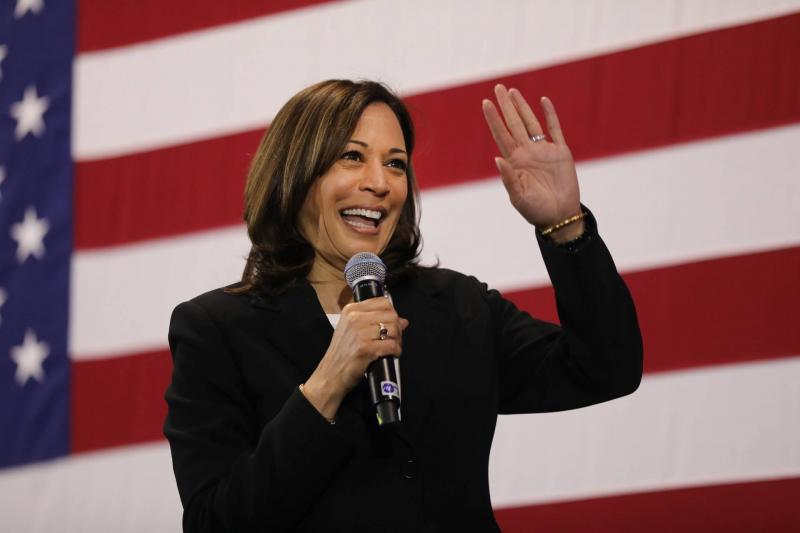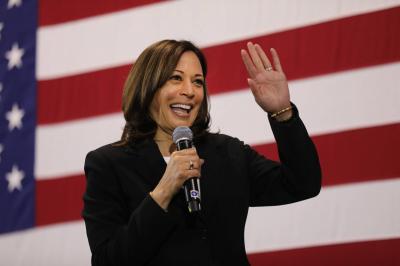U.S. Vice President Kamala Harris has become a growing concern for Republican Party donors as several prominent figures within the Democratic Party begin to rally behind her. Leading Democrats claim Harris would be a natural successor to President Joe Biden if he succumbs to increasing pressure and steps aside from the Democratic nomination for the elections scheduled for November this year. Now, donors, activists, and officials in the Democratic Party are questioning whether Harris has a better chance than Biden to defeat former President and current Republican candidate Donald Trump. Biden has repeatedly confirmed his intention to run.
If Harris, 59, a former U.S. Senator and former Attorney General of California, becomes the Democratic nominee and wins the November 5 election, she would be the first female president in U.S. history. Harris is currently the first African American and Asian American Vice President. She has held her position in the White House for three and a half years, during which her start was marked by a lackluster performance in her duties, staff changes, and a premature focus on political issues, including the Central American immigration file, which has seen little success.
Over the past year, many within the White House and Biden's campaign team have expressed concern that Harris could pose a liability to the campaign, but according to Democratic officials, the situation has changed significantly since then, as Harris has taken action on abortion rights and begun reaching out to young voters.
Recent polls indicate that Harris's performance could be better than Biden’s against Trump, although she would face significant competition. A poll conducted by CNN and released on July 2 showed that voters preferred Trump over Biden by six percentage points, with Trump at 49% and Biden at 43%. Harris's support was at 45% compared to Trump's 47%, a difference that falls within the poll’s margin of error. The poll also revealed that support for Harris among independents was at 43% compared to 40% for Trump, while moderate voters from both parties supported her at 51% against Trump's 39%.
Former First Lady Michelle Obama, who has never expressed interest in entering the presidential race, was the only figure to receive higher results among potential alternatives to Biden. An internal poll released by the Biden campaign after the debate showed that Harris had the same chance of defeating Trump as Biden did, with 45% of voters saying they would vote for her compared to 48% for Trump.
Influential Democrats stated that Harris would be the best Democratic challenger if Biden chose to step aside. Among them were Representative Jim Clyburn, who played a key role in Biden's 2020 victory, Representative Gregory Meeks from New York, a prominent member of the Congressional Black Caucus, and Democratic Representative Summer Lee from Pennsylvania. A congressional aide noted that House Minority Leader Hakeem Jeffries spoke similarly to his colleagues.
Pauline Lee, a Trump donor in Nevada, stated after the June 27 debate, "I’d prefer that Biden stays in the race" rather than have Harris replace him, expressing her belief that Biden has proven to be "incompetent." Some on Wall Street, a crucial fundraising hub for the Democratic Party, have started to express their preferences for candidates. Suno Farghiz, a strategic advisor at Carson Group Financial Services, noted, "Biden is already trailing Trump, and it's unlikely he can close that gap given the current state of his campaign. Having Vice President Harris would likely improve the Democrats' chances of retaining the White House." He added, "Her chances could indeed be better than Biden's at this stage."
The majority of Americans view Harris negatively, similar to how they view Biden and Trump. A poll conducted by FiveThirtyEight found that 37.1% of voters supported Harris while 49.6% opposed her, and 36.9% supported Biden against 57.1% opposing him, while Trump had a support of 38.6% compared to 53.6% opposed.
Since the Supreme Court overturned the constitutional right to abortion for women in 2022, Harris has become the most prominent voice in the Biden administration on reproductive rights, a crucial issue that Democrats believe will aid them in the 2024 elections. Some Democrats believe that Harris can energize key Democratic-leaning groups that have become disenchanted with Biden, including Black and young voters, as well as those dissatisfied with Biden's handling of the war waged by Israel on Gaza.
Tim Ryan, a former Democratic Congressman from Ohio, stated in a recent op-ed, "She would energize members from the Black and Brown communities and those with ties to the Asian Pacific in our coalition... She will immediately attract the disaffected youth in our country back to the fold.” He also believes suburban women may feel more comfortable with Harris compared to Trump or Biden.
Harris’s public stance on Israel as Vice President aligns with Biden’s, but she was the first prominent political figure in the U.S. government to call for a ceasefire in March. Abbas Alawi, a member of the "Uncommitted" movement, which withheld their support for Biden during the primaries due to his support for Israel, remarked, “Simply changing the candidate does not address the main concern" of the movement. If Biden were to step aside, other Democrats could compete for the party's nomination. If the party favors another candidate over Harris, some Democrats argue that this could cost the party many Black voters, whose support was pivotal for Biden's 2020 victory. Adrienne Shropshire, the executive director of the BlackPAC group, stated: "There is no alternative to Kamala Harris."
But some Democratic donors suggest that Harris may struggle to attract moderate Democrats and independent voters who are drawn to Biden's centrist policies. The two parties are vying for independent voters' support to bolster their candidates' chances in the presidential race. Dmitri Melhorn, a fundraiser and advisor to LinkedIn co-founder Reid Hoffman, said, "Her biggest weakness is that her image is tied to the far-left wing of the Democratic Party... The far-left wing of the Democratic Party cannot win a nationwide election... that challenge will be hers to overcome if she becomes the party's nominee."
Harris can benefit from the funds that Biden's campaign has already raised and inherit the existing campaign infrastructure, which is a critical advantage with just four months to go until voting day on November 5. However, strategic analysts argue that any Democratic campaign will still need to raise hundreds of millions of dollars before voting to be successful. A source in the Democratic National Committee stated, "I can tell you that we are having a significant hard time raising funds in support of her." During her previous presidential run in the 2020 election, Harris was unable to gather the same level of funding that Biden achieved. She withdrew from the race in December 2019, the same month her campaign announced raising a total of $39.3 million in contributions, while Biden’s campaign raised $60.9 million in the same period.
Nonetheless, Biden's campaign raised a record $48 million in 24 hours after announcing Harris’s selection as his running mate in the 2020 presidential race. Some Democrats believe that Harris’s background as a prosecutor could add polish to her personality and positions in a direct debate against Trump. Melhorn believes, "She has an impressive focus, she is strong and smart, and if she takes on the prosecution's argument against Donald Trump's violations, she will take him down."
Republican attacks on Harris have increased since the possibility of her replacing Biden emerged. Conservative commentators have revived criticisms she faced during the 2020 race, including remarks from some Democrats claiming she laughs too much and isn’t truly tested or qualified. Kelly Dittmar, a political science professor at Rutgers University, notes that such harsh criticisms come within a long history of diminishing and insulting women of color in politics. She added, "Unfortunately, relying on racist and sexist attacks and using misogynistic metaphors against female candidates is common in history and continues to this day."




